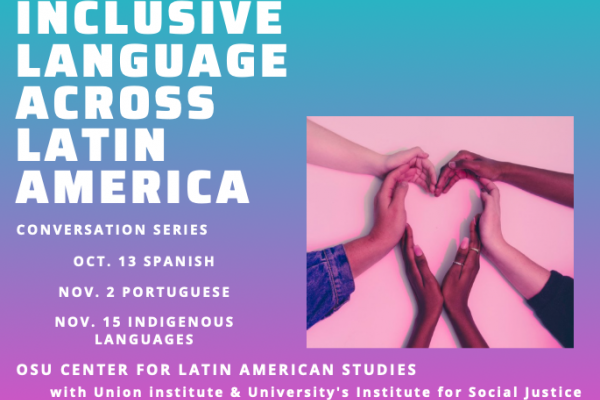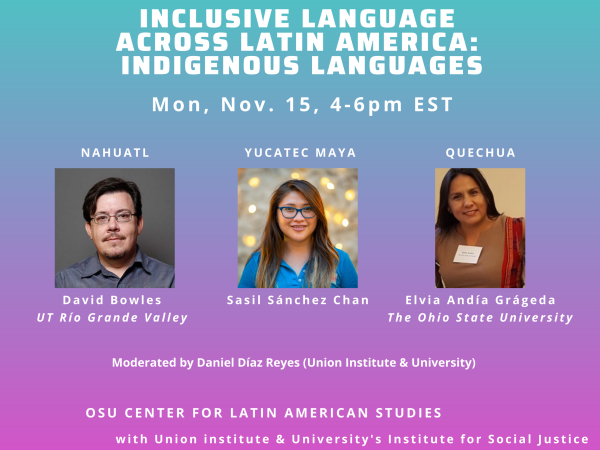
Join us via Zoom on Mon., Nov. 15, from 4-6pm (EST) for a conversation about inclusive language in three indigenous languages of Latin America: Nahuatl, Yucatec Maya, and Quechua.

Meet the Panelists:
David Bowles (he, él, yehhuatl) is a Mexican American author and translator from south Texas, where he teaches literature and Nahuatl at the University of Texas Río Grande Valley. He has written more than two dozen titles, most notably the multiple-award-winning book They Call Me Güero and My Two Border Towns. His work appears in venues such as The New York Times, Translation Review, English Journal, School Library Journal, and the Journal of Children’s Literature. His research into Indigenous Mesoamerican languages has led to critically hailed collections of his translations such as Flower, Song, Dance: Aztec and Maya Poetry and Feathered Serpent, Dark Heart of Sky: Myths of Mexico. David is one of the co-founders of #DignidadLiteraria, a grassroots activist campaign for greater Latinx representation in publishing. In 2017, he was inducted into the Texas Institute of Letters and now serves on its governing council.
Sasil Sánchez Chan (she, ella): Poeta, editora y activista digital maya. Licenciada en Lingüística y Cultura Maya por la Universidad de Oriente. Egresada del Programa de Escritores Mayas de la Escuela de Creación Literaria por el Centro de Estatal de Bellas Artes. Desde la adolescencia, ha participado en una amplia gama de actividades culturales y literarias. Ha sido becaria del Fondo Nacional para la Cultura y las Artes, del Programa de Jóvenes Creadores en la disciplina de Letras en Lenguas Indígenas: poesía; Becaria del Programa de Estímulo a la Creación y desarrollo artístico (PECDA). En 2016, obtuvo el Premio Estatal de la Juventud en la categoría de Preservación y Desarrollo Cultural.
Actualmente coordinadora del Club de Lectura SOLYLUNA que promueve la alfabetización temprana en comunidades del interior del estado de Yucatán y editora de K’iintsil, contraportada del periódico peninsular La Jornada Maya.
Elvia Andía Grágeda (she, ella, pay) is a linguist specializing in the study and instruction of Bolivian Quechua and Spanish. She holds a Master’s degree in Linguistic Policy of Indigenous Languages in Higher Education, and investigates the role of Quechua in such policies, particularly in the Quechua Public Indigenous University in Bolivia. She has worked as the Departmental Coordinator in the Ministry of Education for the country of Bolivia in Intra- and Intercultural Multilingual Education. Andia joined Ohio State in 2016 and coordinates the Quechua program for both undergraduate and graduate students across six institutions. She is the world’s first certified OPI tester for Quechua and has publications centering on teaching methods and indigenous stories. In 2019, she won the Premio Guamán Poma de Ayala in Indigenous Language, a national literature prize in Bolivia, for her novel written in Quechua.
Moderator:
Daniel Diaz Reyes, PhD, JD, (he) teaches in the Education Studies concentration of the Interdisciplinary Doctoral Program at Union Institute and University. He holds a professional background in Anthropology, Education, Ethnic Studies and Law. His definition of community is based with the Afro-Indigenous people of Costa Chica and Nahuatl speakers of southern Mexico and the diaspora. His current research concentrates on pedagogical praxis, politics of schooling, and curriculum design to support implementation of liberatory projects in education. His projects address education systems as sites of social reproduction to examine transnationalism, human movements, and youth culture with a focus on Black, Brown, Chicana, Latinx and Indigenous communities.
